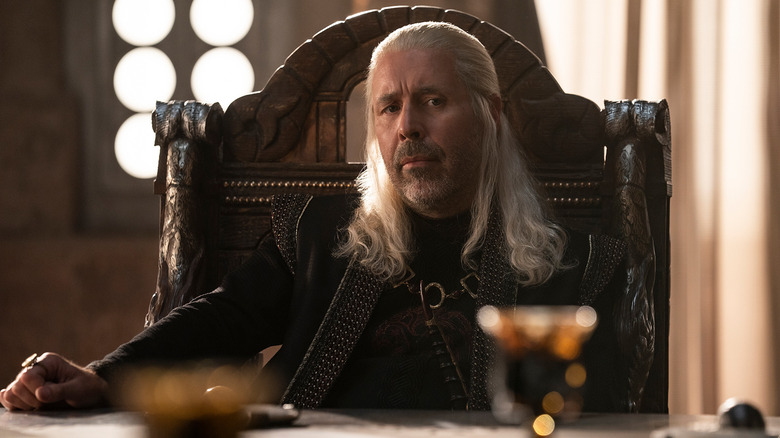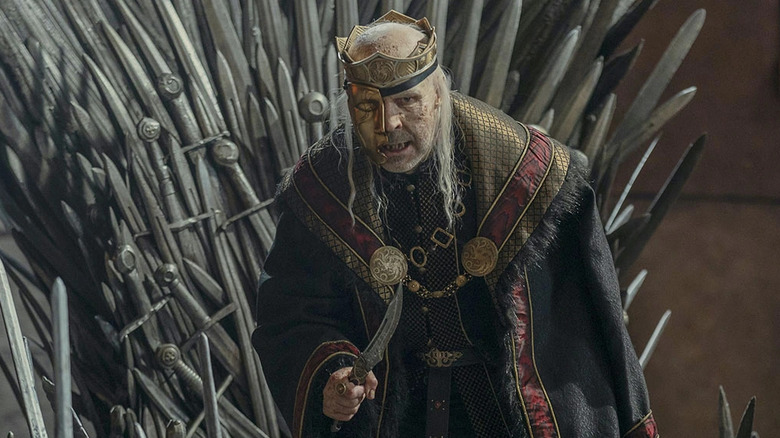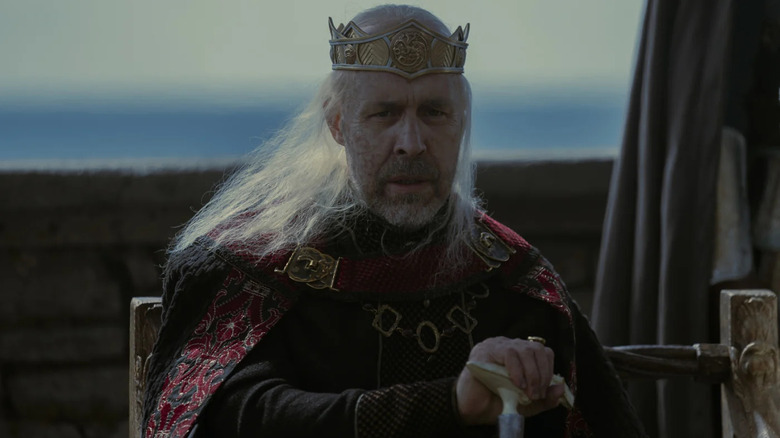The House Of The Dragon Performance That George R.R. Martin Thinks Improved Upon His Work In A Major Way
Whenever a popular book series gets a television or film adaptation, certain debates are bound to occur. There will be those who loved the books and believe that anything the adaptation changes from the original texts is awful blasphemy. There will be those who believe that the on-screen version thoroughly improved upon the source material. These debates between book purists and show watchers are often strident and unending.
When "Game of Thrones" was airing, these debates occurred just as they always do. But by the time the show's lackluster later seasons had aired, it seemed that the book defenders had more or less won the debate. In the show's early seasons, when they followed the plot of the book more precisely, the show was extremely well-written and near-universally beloved. As the show began to stray more from the source material, the quality cratered. When it wasn't able to ape directly from the work of George R.R. Martin, the show wasn't able to stay afloat.
With the "Game of Thrones" spin-off "House of the Dragon" now in full swing, it appears that Martin himself is entering the arena of the never-ending debate. But he isn't on the side you'd expect. In a recent blog post, Martin gave kudos to actor Paddy Considine, who portrayed King Viserys Targaryen in the first eight episodes of the new series. Martin praised Considine's performance and said that, in his opinion, the show's version of the character far surpassed the one he wrote of in the book "Fire and Blood."
Bringing Viserys to life
Martin has never been an opponent of the screen adaptations of his work, writing multiple episodes of "Game of Thrones" himself, even if he could never work out a cameo appearance on the program. He actively pushed for "House of the Dragon" to be the first spin-off of the original series, and he's generally generous and trusting with the handling of his work.
It seems he's satisfied with how "House of the Dragon" has turned out, especially the handling of the Viserys character, according to his blog post.
"Kudos to Eileen Shim, the scriptwriter, to Geeta Patel, the director, to our incredible cast... and particularly to Paddy Considine, for his portrayal of King Viserys, the First of His Name. The character he created (with Ryan and Sara and Ti and the rest of our writers) for the show is so much more powerful and tragic and fully-fleshed than my own version in 'Fire and Blood' that I am half tempted to go back and rip up those chapters and rewrite the whole history of his reign. Paddy deserves an Emmy for this episode alone. If he doesn't get one, hey, there's no justice. Meanwhile, I am going to give Archmaester Gyldayn a smack for leaving out so much good stuff."
To hear this praise from one of the best-regarded fantasy writers of modern times has got to feel good for Considine, who turned in an amazing performance during his stint on the show, which appears to have come to an end.
A vulnerable performance
"Fire and Blood," the book from which most of the story shown on "House of the Dragon" was adapted, was presented as a historical text within the fictional land of Westeros. Because of this, it makes sense that an adaptation of the characters from the book would be able to greatly expand upon the source material. Historical texts are usually just summaries of events, after all, without any way of seeing the more personal moments of the figures within.
Paddy Considine's performance as Viserys was especially transformative, however. Even by the standards of other characters in "Fire and Blood," Viserys was not very well fleshed-out. He served mainly as a plot device to kick off the main story of his era, the "Dance of the Dragons" as it is referred to both in and out of universe.
Considine made the character his own, presenting Viserys as a deeply flawed yet sympathetic king. He could be politically incompetent and spineless, but he had a deep love for his family. He could let his advisors control him, but in episode eight's amazing scene where he marches to the Iron Thrones one last time, he shows he has the heart of a king. Even the slow transition from a younger, haler Viserys to the old and decrepit man he is by his final episode is breathtaking, and Considine's performance as a dying man who just wants his family to make amends is heart-wrenching.
Hopefully, this is not the last time Martin believes that "House of the Dragon" exceeds his writing, because if so, the show will continue to be excellent. Let's hope it's not so amazing that it further distracts Martin from finishing "The Winds of Winter," however.


